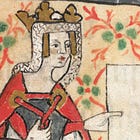To start the new year, I wanted to send a quick note of gratitude out into the world. Moments spent exploring thoughts which warped into long-form have fueled my fire within these last 365 days. Finding this space to link with like-minded folks discussing inequities and the development of the medieval woman into the modern one was an unexpected light-source within 2023, and for that, and you, I am thankful.
To any one that has spent their precious time with my words, thank you. Thank you for lending my words your most valuable resource; I am honored and hope I have served your time well.
A deep want for this space was catalyzed within me while researching Jacquetta. How could I not fall into wanting more from the women around her? They were fierce, intelligent, and often massive cultural influences void from the history books, thus 15CFeminist was born.
What to expect From The 15CFeminist in 2024
Within this space I will continue to investigate common themes between our contemporary experiences to those of our medieval ancestors. Some of the paradigms and people we will explore this new year:
Women aging in a patriarchy
I was recently lost in thought over who we consider to be England’s greatest monarchs and drivers of culture, and how they get onto that list. When female monarchs are able to age with the crown, they often outshine their male counterparts, leaving the country far more stable than they inherited it with far more progressive movements of culture. Those women that didn’t rule but did deeply impact the world around them often did so through their patriarchal roles well into their senior years.
The women of the Middle Ages are often upheld for their roles within a patriarchal society (see: ‘Mother of Kings’) but they were always so much more than just wives and mothers. But, being upheld only by patriarchal role-playing is a sentiment that modern women can fully understand and empathize with. As Mary M. Gergen explores in her 1990 article for the Psychology of Women Quarterly, Finished at 40, Women’s Development within the Patriarchy: Psychological theories of women’s lives in middle age and beyond are restricted, negative, and scarce. An overview of women’s adult development in textbooks and the professional literature indicates that (a) the prevailing focus of concern is the woman as a biological creature, especially as a mother; (b) the proposed life cycle trajectory is one in which the woman’s life goes into decline after approximately age 40; and (c)little attention is paid to the particular character of women’s life narratives. Such treatments of adult womanhood are advantageous to a patriarchal system of power.
So, I want to explore medieval powerhouses that out aged their contemporary male-counterparts while also out performing them in the category of cultural influence. They deserve to be known for who they were, not for who they made or married.
Medieval misogyny and misandry
This comment sent me down a thought spiral that led to research and wanting to explore it more within the context of the Middle Ages. I’m not sure where we will go with this one, but I’m excited for the time that will surely be spent staring off into the void while my brain processes the threads of history and literature.
Thank you for this comment and your support,
. ❤️30 Female Kings from 1300-1800, in 3 parts
In three parts, we will investigate 30 female kings that ruled between 1300-1800. These women defied traditional gender roles and expectations to wield political, military, and economic power. Through their leadership and influence, they challenged the patriarchal systems of their time and paved the way for future generations of women. As we delve deeper into the lives of these remarkable women, we gain a greater appreciation for their resilience, intelligence, and courage.
These pieces will resemble short biographies rather than thought spaces. The last year (plus) has been deep in research for my book and I’m finally at a point where research gaps have been addressed and forward movement is required (yay!). The ease of short biographies will allow me to switch back to my main project without too much time spent, a gift I am giving my future-self.
The impossibility of the patriarchy now and then: Early Middle Frankish society
Restricting access to women’s reproductive health, litigating women’s bodies, and governmental attacks on higher education are all institutional ways in which the patriarchy enforces it’s dominator model onto the modern woman. We often focus these conversations on the women they impact (rightfully so), but men are hurt by these patriarchal legalities too both on the social and the individual level. And much like the men in Early Middle Frankish society, the passive absorption of benevolent sexism via laws passed and movements participated in lead to (surprise!) sexism employed.
Medieval to Modern Beauty Standards
Two/three reposts with additional thoughts and research
Another gift to future me. My first few SubStack pieces were experiments for an unknown platform with, admittedly, little expectation or understanding. I’d like to reassess my thoughts and add to them, update the aesthetics and include voice overs for the audio-inclined.
As always, keep questioning the history you’ve learned and the literature you’ve read.
Joy and love are acts of patriarchal defiance, so please know I am sending both your way, happy 2024!










Exciting and amazing things ahead. Thank you for all the great pieces in 2023. I'm looking forward to seeing you grow and grow as a writer in 2024. Keep it up
Thank you for the mention, Kate! You’re such a Queen!